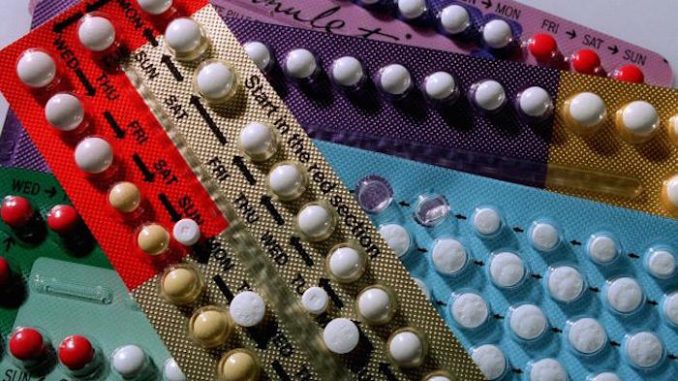
Are you on the Pill? You’re more likely to suffer from depression: Women who use the contraceptive pill are up to 70% more likely to be on antidepressants, with the number even higher among adolescents.
The news is based on just released data from the largest ever study conducted into side effects related to female contraceptives. More than 1 million women aged 15 to 34, with no prior history of depression, were included in the European study.

BYPASS THE CENSORS
Sign up to get unfiltered news delivered straight to your inbox.
You can unsubscribe any time. By subscribing you agree to our Terms of Use
Latest Video
The research, conducted by the University of Copenhagen and published in the peer-reviewed medical journal JAMA Psychiatry, has concluded what many women have suspected for years – that there are strong links between the Pill and depression.
New Statesman reports:
While it may seem obvious that a medicine which impacts on hormone levels can have an effect on mood, the research, undertaken in Denmark, shows stronger links than some may have expected. Its study of over a million women aged 15-34 found that those taking a combined contraceptive pill are 23% more likely to use antidepressents than those that do not. That statistic was even higher for the progesterone-only pill (34%), the patch (100%), and the vaginal ring (60%).
The link was strongest in adolescents: those using combined oral contraceptives are 80% more likely to take antidepressents. Put alongside another recent study, showing the percentage of teenage girls who have experienced mental health problems has increased dramatically in under a decade, this is a potentially troubling statistic.
Of course, women have mentioned these problems for a long time – but does it actually put them off using the pill? To find out more about women’s experiences, I created a survey asking them to share their thoughts.
What women said
The immediate response seemed to justify the study’s findings.
this was me on Microgynon pic.twitter.com/l9JoWy4xc6
— Bethany Lane (@bethrlane) October 3, 2016
The majority of the 257 women who answered were still taking the pill: 54.9% of them. Many of them had positive feedback, too: 32.6% said they liked that the pill helped with cramps, and plenty of women said they didn’t notice any impact on their mood. Some even said the pill had a positive influence, such as one respondent who said it made her “calmer”.
“Nowadays it seems as though everyone is talking about the negative consequences of the pill. I would like to report an entirely different experience. I have never had any side effects, whether physical or mental. The pill has set me free.
My experience has been wholly positive — it’s given me so much control (so I don’t have to be on my period when camping, on holiday, etc.) and I’m really grateful for that.”
Others, though, said the pill caused them anxiety, depression, or mood swings – although in some cases they “balanced out” after a while, or got better on a different type of pill.
“On microgynon I had ten minute crazy angry-sad mood swings. Extreme mood swings for a short duration. I started taking when I was ~16 so assumed I was just unstable. Got off Microgynon and those swings stopped. Went onto Yasmin and it fed into my depression and made me want to self harm which I hadnt had the urge to do for 4+ years. Got off Yasmin onto loestrin 20 and have had zero emotional problems on this pill.
On the pill, ironically, I had no libido. However, the mini pill has no such side effects!”
For some women, the change felt severe. “Hellish mood swings which sunk into depression”, one reported, while others mentioned anger, irrational upset, or being generally more emotional or “weepy”. One respondent said that she felt “felt like my emotions were much more concentrated: like someone had turned the volume up on all of them: so the same emotions, just more intense”. For others, the opposite was true: “I felt slightly depressed, like all my emotions had been slightly blunted”.
“It seems blindingly obvious to me and my data pool of twentyish girlfriends with whom I share contraceptive detail that progesterone a) makes you eat more b) makes you gain weight more easily by adjusting blood sugar and fat storage mechanisms and c) makes a minority but a sizeable minority – about a quarter of us – feel low, sluggish and mildly depressed.”
Sometimes, women attributed changes to the pill only after they stopped taking it:
“It’s more I noticed the changes when I came off – so realised the pill repressed by sex drive, made me more woolly-headed. Since coming off I have felt that change.”
Others were told by doctors that their symptoms weren’t related to the pill, only to find they stopped when they stopped taking it:
“I tried various different ones over the years and they all gave me chronic migraines. After I stopped taking it, they went away! Various doctors over 5+ years told me the two were unrelated.”
The best option
So why might women stick with the pill, even if it makes them miserable?
Some of it may be down to the fact that women are more likely to think they’re making a fuss if something has adverse effects. But in many cases, it just suits them better than any alternative.
After all, the injection and implant can have their own side effects, condoms are fiddly and expensive — unless you can be bothered to trot to your local sexual health clinic for some free ones each month – which few of us do, given you can just add them to your basket at the supermarket. And the copper IUD, one of the few long-term non-hormonal options, gives some of us periods reminiscent of the lifts in The Shining.
That leaves withdrawal and the rhythm method, which – even if their perfect use success rates aren’t as bad as you’d think – are beyond the willpower and diligence of many of us.
More information
It’s not surprising, then, that many women said the pill was their best option. Asked to select which things they liked about it, 60% of respondents liked that the pill gave them control, while 55% said they liked the pill because they didn’t have to deal with condoms.
Several women specifically said the pill was the best method for them, while criticising aspects of it.
“I dislike the fact that it’s near impossible to get the Pill for free anymore. My local sexual health clinic closed down due to budget cuts, so now I end up paying every three months because there’s nowhere close by to access the Pill for free. Another annoying side effect of the Pill besides my bank balance? It’s made my already sizeable breasts even larger. Overall though, it’s the easiest contraception for me.
I don’t like any of the pills I’ve tried — they have all affected my mood to a varying degree but I take it to control irregular periods so it’s my best option.”
Others want more or better insight and advice, ideally from specialists, as well as the space to be honest about their sexual health:
“I only went on it because I went to my doctor about my migraines — I wasn’t sexually active at the time and it was pretty much forced on it to ‘cure my horrible acne’, not my migraines. I’m still angry 6 years later.
I wish anyone (doctor, nurse etc) had asked me about my family history of depression or even taken my side effects more seriously. I thought I was losing my mind!
There isn’t enough information for young women when they make this decision to take oral contraception. Doctors don’t push the available alternatives enough.”
A male pill?
For some women, it’d be a relief to be shot of the burden of arranging contraception altogether. The good news is that the so-called “clean sheets” pill, which allows male orgasm while preventing ejaculation, is in the pipeline — as it were. Researchers at King’s College London and UCL have banded together to begin trials. (Previous versions caused side effects including dizziness, tiredness and stomach upset, which of course women have been dealing with for years while taking the pill, but are apparently beyond the coping capacity of men.)
Another option in development is Vasalgel. This polymer contraceptive, intended to be reversible, is currently being tested through not-for-profit social initiative. But even that may not be enough — 42.7% percent of the women who responded to my survey said they wouldn’t trust a male partner, even one with who they were in a committed, monogamous relationship, to handle contraception for them both – which is fair enough, given the bare facts of who can walk away from an unwanted pregnancy.
Much as women may dream of a contraceptive that doesn’t hurt, is 100% reliable, and doesn’t mess with your hormones (and, well, isn’t abstinence), it’s not clear when that might happen, or what it may be. One thing I’m sure of, though: next time women start saying a medication is making them miserable, we should get the studies rolling ASAP.


